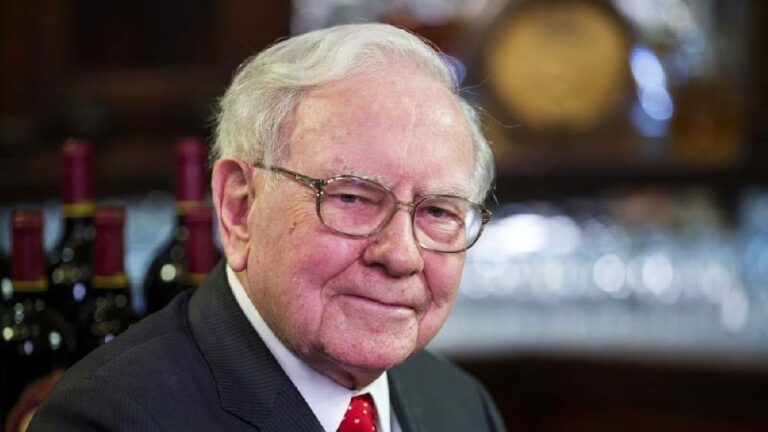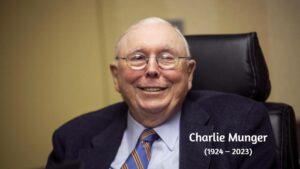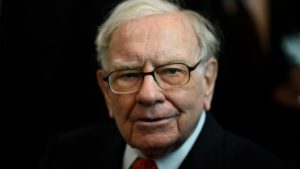Investors have long sought wisdom from the Oracle of Omaha on markets, the economy and life in general. But this year Buffett opened Berkshire’s annual report on a personal note with a dedication to Charlie Munger, who died in November at age 99, just 33 days before the milestone birthday.
Warren Buffett credited his long-time partner with being the architect of the Berkshire Hathaway conglomerate he’s received the credit for leading and warned shareholders in his annual letter not to listen to Wall Street pundits or financial advisors who urge them to trade often.
Buffett said “Charlie was the ‘architect’ of the present Berkshire” who realized early on that it was better to buy wonderful businesses at fair prices. “Charlie never sought to take credit for his role as creator but instead let me take the bows and receive the accolades,” Buffett wrote. “In a way his relationship with me was part older brother, part loving father. Even when he knew he was right, he gave me the reins, and when I blundered he never – never – reminded me of my mistake.”
Munger’s death served as yet another reminder that Berkshire will one day have to move forward without the 93-year-old Buffett at the helm. Berkshire has established a succession plan and vice chairman Greg Abel will one day replace Buffett as CEO while the company’s two other investment managers will take over the stock portfolio. Abel has already overseen all of Berkshire’s many noninsurance businesses since 2018. To a great extent, Berkshire lets its companies run themselves on a day-to-day basis while headquarters decides where to invest all the cash they generate. Buffett told investors in his letter that Abel “in all respects is ready to be CEO of Berkshire tomorrow.”
Buffett said he always writes his letter with smart, long-term investors like his sister Bertie in mind and tries to tell them what he thinks they would like to know about Berkshire. “She is sensible instinctively knowing that pundits should always be ignored,” Buffett wrote about Bertie. “After all, if she could reliably predict tomorrow’s winners, would she freely share her valuable insights and thereby increase competitive buying? That would be like finding gold and then handing a map to the neighbours showing its location.”
Buffett told investors that Berkshire is a safe place to park their cash as long as they don’t expect the “eye-popping performance” of its past because there are no attractively priced acquisition targets out there big enough to make a meaningful difference in the company’s results. But he said Berkshire will be ready to swoop in with its $167.6 billion whenever the casino-like stock market seizes up.
On investing in stocks:
“I can’t remember a period since March 11, 1942 – the date of my first stock purchase – that I have not had a majority of my net worth in equities, U.S.-based equities. And so far, so good. The Dow Jones Industrial Average fell below 100 on that fateful day in 1942 when I ‘pulled the trigger.’ I was down about $5 by the time school was out. Soon, things turned around and now that index hovers around 38,000. America has been a terrific country for investors. All they have needed to do is sit quietly, listening to no one.”
On picking winners:
“Our goal at Berkshire is simple: We want to own either all or a portion of businesses that enjoy good economics that are fundamental and enduring. Within capitalism, some businesses will flourish for a very long time while others will prove to be sinkholes. It’s harder than you would think to predict which will be the winners and losers. And those who tell you they know the answer are usually either self-delusional or snake-oil salesmen.”
On market panics:
“Markets can – and will – unpredictably seize up or even vanish as they did for four months in 1914 and for a few days in 2001. If you believe that American investors are now more stable than in the past, think back to September 2008. Speed of communication and the wonders of technology facilitate instant worldwide paralysis, and we have come a long way since smoke signals. Such instant panics won’t happen often – but they will happen.
“Berkshire’s ability to immediately respond to market seizures with both huge sums and certainty of performance may offer us an occasional large-scale opportunity. Though the stock market is massively larger than it was in our early years, today’s active participants are neither more emotionally stable nor better taught than when I was in school. For whatever reasons, markets now exhibit far more casino-like behavior than they did when I was young. The casino now resides in many homes and daily tempts the occupants.”
On Berkshire’s prospects:
“Berkshire should do a bit better than the average American corporation and, more important, should also operate with materially less risk of permanent loss of capital. Anything beyond “slightly better,” though, is wishful thinking. This modest aspiration wasn’t the case when Bertie went all-in on Berkshire – but it is now.”
On his favourite oil investment:
“At yearend, Berkshire owned 27.8 per cent of Occidental Petroleum’s common shares and also owned warrants that, for more than five years, give us the option to materially increase our ownership at a fixed price. Though we very much like our ownership, as well as the option, Berkshire has no interest in purchasing or managing Occidental. We particularly like its vast oil and gas holdings in the United States, as well as its leadership in carbon-capture initiatives, though the economic feasibility of this technique has yet to be proven. Both of these activities are very much in our country’s interest.”
On Munger’s contributions to Berkshire’s success
“He told me correctly that I had made a dumb decision in buying control of Berkshire. But, he assured me, since I had already made the move, he would tell me how to correct my mistake. In what I next relate, bear in mind that Charlie and his family did not have a dime invested in the small investing partnership that I was then managing and whose money I had used for the Berkshire purchase.
“Moreover, neither of us expected that Charlie would ever own a share of Berkshire stock. Nevertheless, Charlie, in 1965, promptly advised me: `Warren, forget about ever buying another company like Berkshire. But now that you control Berkshire, add to it wonderful businesses purchased at fair prices and give up buying fair businesses at wonderful prices. In other words, abandon everything you learned from your hero, Ben Graham. It works but only when practiced at small scale.’ With much back-sliding I subsequently followed his instructions.”






















